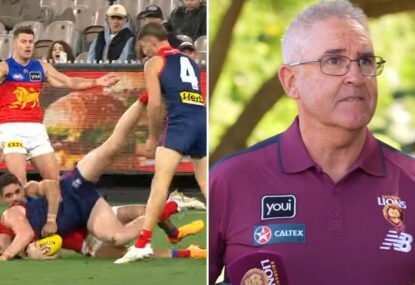You know what I hate about football? It’s not the insistence that the game’s becoming unwatchable, with rolling scrums following the ball, constant packs, and low scoring. I’m fine with that.
Sometimes, congestion’s simply a result of unrelenting pressure, and high scores don’t necessarily equal a good game. Usually, they equal basketball.
What I hate are the conclusions that are drawn as to why football’s become this way – that coaches and their teams have become too defensive, that players have become too negative, that strategies are about minimising risk and thus avoiding blowouts.
Sure, there’s probably an element of any or all of those reasons contributing to the way the game’s evolved, but there’s a greater and far more pervasive influence.
The AFL.
You see, the AFL’s about continuity. We see it in the rules they implement, and the rules they trial. They don’t like stoppages, so the ball’s got to be balled up quicker, and players have less time to get rid of it following a mark or a free kick. It used to be a player had to wait until a goal umpire had finished waving his flags before kicking out; the AFL changed it so players could kick out immediately.
We see far more incidence of deliberate out of bounds being paid, thus encouraging the players to try keep the ball in. We have the rushed-behind rule – well, sorta. And in pre-seasons we’ve seen a rule trialled where the last player to touch the ball once it’s gone out of bounds is penalised, and giving the opposition get a free kick, thus again forcing players to try keep the ball in and moving.
The AFL love their continuity. They are phobic about the game stopping, as though if there’s too long a pause the crowd will storm from the stadium and audiences will switch channels.
They’re all about keeping the game moving. Moving. Moving. Because a moving game, apparently, means the fans stay captivated.
And to this end, the AFL have done something – consciously or not, I don’t know – by chipping away (and thus destabilising) one of the building blocks the game is built upon: tackling.
In the modern game umpires have let the game flow more and more following a tackle. Early last year, when there was (yet another) change in interpretations which exemplified this attitude, media and commentators lauded it. It was great. The game just flowed on. And on. And on. No stoppages. Hurrah.
But at what cost?
Games are now riddled with instances of players blatantly dropping the ball – sometimes dropping it with impunity, because they know there’s a greater chance they’ll win lotto rather than get pinged. Something that’s also crept into the game over the last several seasons is throwing the ball from a tackle. It’s becoming an art-form.
The counter might be the game’s so fast, that umpires are out of position. Maybe. Sometimes. A few times. Less than you’d imagine, really.
I’ve watched umpires have a clear line of sight of an illegal disposal and ignore it. This is a conscious choice, a clear directive. If you’ve watched the game closely over the last several years, you would’ve seen this, too.
Because the AFL want to keep the ball in motion.
There’s the mindset: keep the ball moving. No stoppages because, theoretically, this eliminates scrums forming.
But that’s actually a fallacy. Explore what happens here.
A player drops the ball. It lands at his feet and everybody swarms on it. So by the very nature of trying to keep the game moving, we’ve inadvertently created a pack.
Here’s an analogy: go to the beach and drop a chip, then watch the seagulls swarm in and fight over it.
Then we perpetuate a cycle: congestion, ball up, tackle, congestion, ball up.
I’m so tired of watching this.
The rule is simple: if the tackled player doesn’t dispose of it legally by hand or foot, if he drops it to the ground, if he puts it on the ground, then it’s dropping the ball.
It really is that easy.
Pay this unfailingly again, and you know what’ll happen? You’ll create a mini-stoppage (for the free), but players will break and spread to create play and re-offer position to the ball-carrier. Throw the chip and see those gulls fly. Congestion will be cleared immediately. Potentially, you’ll actually counter constant stoppages involving ball-ups and scrums, because the ball will be moving more often – and it’ll be moving precisely (i.e. a kick) rather than dropped.
The thing that frustrates me – which actually leaves me indignant – is that tackling is integral to our game. You can have two teams playing, one tackling ferociously and unrelentingly, the other to a lesser extent, and yet they’re rewarded equally because the rule is regularly snubbed. How does that work? Where’s the reward for endeavour? What’s even the point of tackling? Under the current mindset, we may as well eliminate it and complete the game’s conversion to Gaelic football.
Over the years, the AFL have introduced some absurd rules (e.g. the rushed behind, hands in the back) which have devolved into little more than novelties paid with the frequency of Loch Ness monster sightings. They’ve also introduced interpretations which have muddied rules (e.g. prior opportunity – if you’ve blatantly dropped the ball, it shouldn’t matter whether you’ve had prior opportunity or not), and now they’ve diluted one of the fundamentals of the game, which unwittingly damages the fabric of the way the game is meant to be played.
Reintroduce it. Zero tolerance. And watch the game clean itself up.


































































































